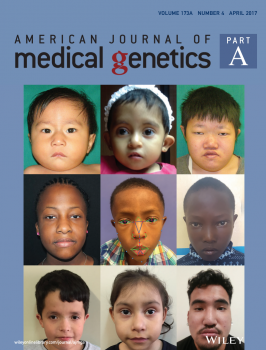Share ’17M Contributes to 22q Deletion Syndrome Study in American Journal of Medical Genetics

Through his collaborative work with the Children’s Hospital of Philadelphia’s 22q and You Center, Genetic Counseling major Matthew Share ’17M contributed to “22q11.2 deletion syndrome in diverse populations,” a study featured on the cover of American Journal of Medical Genetics’ April 2017 edition.
The project was supported by Share’s ongoing study of 22q11.2 deletion syndrome, also known as DiGeorge syndrome or velocardiofacial syndrome. The genetic condition can present more than 180 clinical symptoms that range in severity, including heart defects, cleft lip and palate, low levels of calcium in the blood, immune deficiencies that increase risk of infection, developmental disabilities, social difficulties, and distinct facial features.
Led by Dr. Paul Kruszka, a genetic epidemiology expert at the National Institutes of Health (NIH), the team of researchers hypothesized that, if the hallmark characteristics of the condition differ by race, 22q11.2 deletion syndrome may be under-recognized in minority populations.
Much of the research was conducted through digital facial analysis technology, which enables genetic syndrome diagnosis based on facial features. Among several outcomes, the study proved this to be an efficient method of identifying the disorder when traditional resources are not available.
For his senior thesis, Share will continue researching 22q11.2 deletion syndrome with Donna McDonald-McGinn MS, CGC, associate director of Clinical Genetics at CHOP and program director of the 22q and You Center. Using facial recognition software developed by FDNA to study an African American cohort at CHOP, Share hopes to determine whether 22q11.2 deletion manifests in different ways based on race.
“[McDonald-McGinn], my thesis mentor at CHOP, is actively involved in 22q11.2 deletion syndrome research across the globe,” said Share. “The cohort we are studying for my thesis seemed like a natural addition to this NIH study. CHOP’s cohort allowed individuals of African descent to be studied, and was a large addition to the Caucasian, Asian, and Latin-American cohorts represented.”
After graduating in May, Share intends to work for an adult clinical genetics program in the Philadelphia area.


